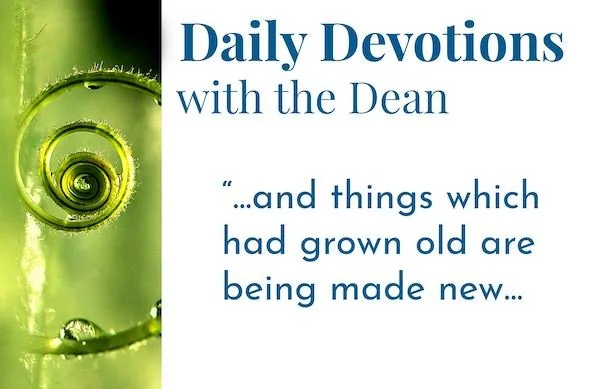Thursday • 11/23/2023 •
Thursday of the Twenty-fifth Week After Pentecost (Proper 28)
This morning’s Scriptures are: Psalm 105; 1 Maccabees 4:1–25; Revelation 21:22–22:5; Matthew 18:1–9
This morning’s Canticles are: following the OT reading, Canticle 8 (“The Song of Moses,” Exodus 15, BCP, p. 85); following the Epistle reading, Canticle 19 (“The Song of the Redeemed,” Revelation 15:3–4, BCP, p. 94)
Welcome to Daily Office Devotions, where every Monday through Friday we consider some aspect of that day’s Scripture readings, as given in the Book of Common Prayer. I’m Reggie Kidd, and I’m grateful to be with you. On this Thursday in the Season After Pentecost our readings come from Proper 28 of Year 1 in the Daily Office Lectionary.
1 Maccabees: continuing God’s victory. Today is the next to last day of our brief introduction to the intertestamental book of 1 Maccabees. Fittingly, the Daily Office commends the reading/singing of “The Song of Moses” following the reading of today’s passage, 1 Maccabees 4:1–25. In this reading, Judas Maccabeus couches his hard-won triumph in terms that recall the victory of the people of God under Moses over Pharaoh and his army: “Remember how our ancestors were saved at the Red Sea, when Pharaoh with his forces pursued them” (1 Maccabees 4:9). Judas Maccabeus sees the Israel of his day carrying forward the great story of God delivering his people, and so he leads them in the psalmist’s refrain, “For he is good. for his mercy endures forever” (1 Maccabees 4:24; see Psalm 136, throughout).
Image: Hannah Cohoon - made in 1845, Public domain, via Wikimedia Commons
Revelation: God’s new city. Today also happens to be the next to last day of our survey of Revelation, a peek into the final chapter of God’s grand story of reclamation, redemption, and renewal. Symbolic details flesh out what it is for God finally to dwell among us: God himself (the incarnate God-Man) is the temple. Thus, the new city that has come down from heaven has no temple in it. God’s very presence provides all the light anybody needs, so there’s no need of sun or moon. With all enemies vanquished, city gates will never need to be closed. Access to “the tree of life” that had been denied at the Fall in the Garden of Eden is opened in this new Edenic city. A “river of the water of life,” flows through it, nourishing trees that bear leaves “for the healing of the nations.” Where curse had ruled for millennia, now there’s life and health and peace.
Personal benefits that John lists, well, honestly, they outstrip my capacity to imagine them. What does it mean to “see the face” of the invisible God, unless, perhaps John means we see his image bearer, Jesus Christ, God-incarnate (Revelation 22:4)? God’s name on our foreheads (Revelation 7:3; 14:1; by way of contrast, see 13:16;17:5) means we will have been forever claimed as God’s cherished possession. And the notion that we will “reign forever and ever” can only mean that life in the new Jerusalem will not be static; in a vast universe emerging from the cloud of dissolution and decay, we will have dominions to explore and tasks that renew the mandate to our original parents to “subdue … and have dominion” (Genesis 1:28).
Matthew: readiness for life in the city of God. In Matthew 18, Jesus elegantly lays out the path to preparedness for life in the new Jerusalem. To “see God” in the new Jerusalem when it comes, we must see the face of Christ in the little children now. “Whoever welcomes one such child in my name welcomes me” (Matthew 18:5).
To prepare ourselves to bear the name that declares his permanent proprietorship on our brow, we monitor our lives in the now, looking to purge our hearts of desires that would take us where errant eyes or feet or hands would otherwise take us: “If your hand or your foot causes you to stumble…” (Matthew 18:8–10). We exercise equally diligent care in preparing ourselves to live in a place where “nothing unclean will enter it, nor anyone who practices abomination or falsehood” (Revelation 21:27). Readying ourselves, in other words from Revelation 21, to “bring into it the glory and honor of the nations”—specifically, offering ourselves as living sacrifices.
It follows, then, that to ready ourselves for whatever dominion is ours in the hereafter, we must learn to rule ourselves in the here and now. We learn that the school of greatness is the school of lowliness: “Truly I tell you, unless you change and become like children, you will never enter the kingdom of heaven. Whoever becomes humble like this child is the greatest in the kingdom of heaven” (Matthew 18:3–4).
Be blessed this day,
Reggie Kidd+













